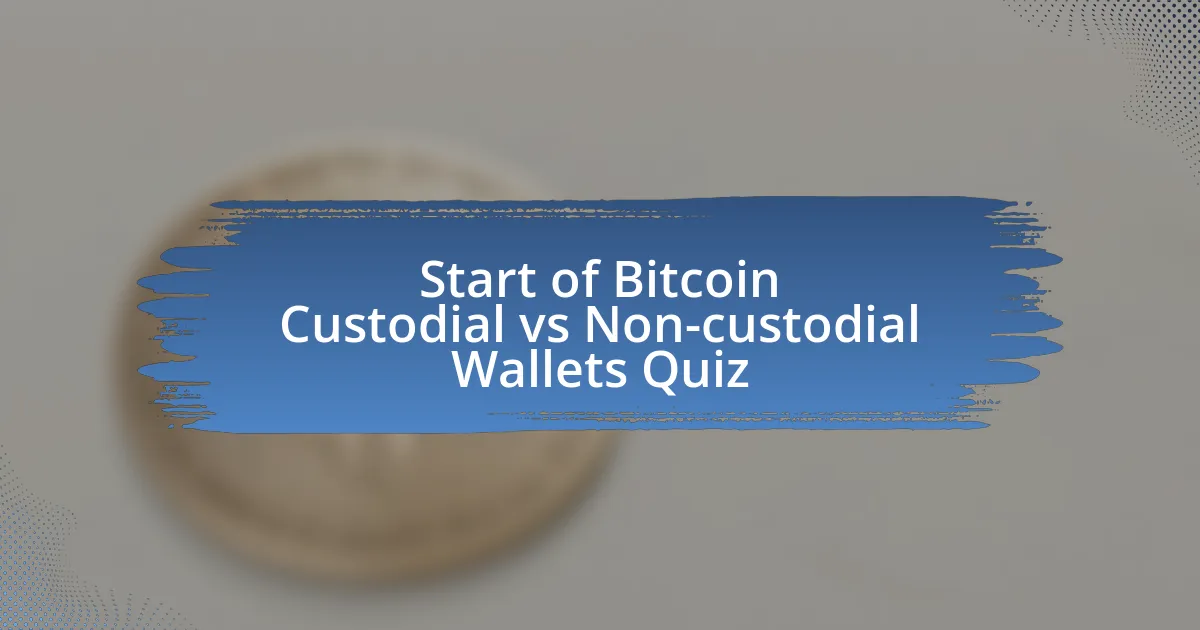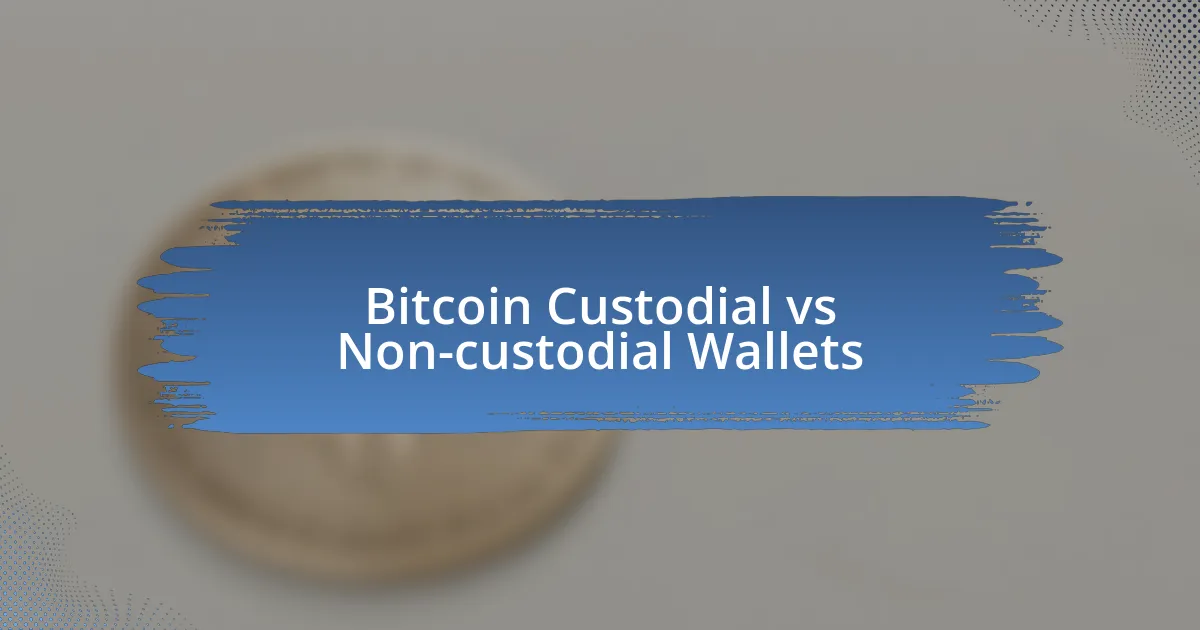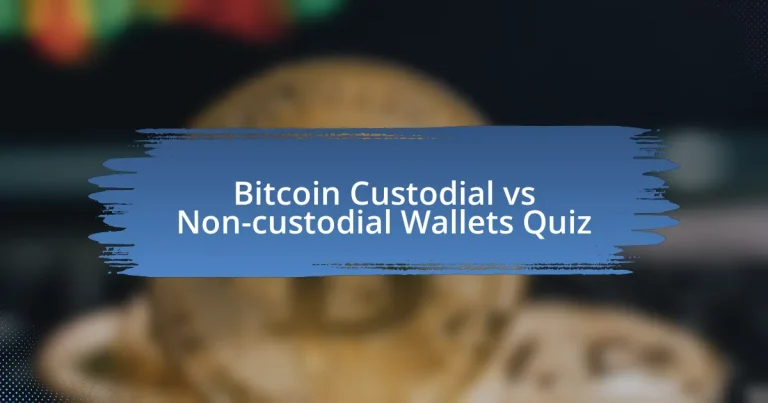
Start of Bitcoin Custodial vs Non-custodial Wallets Quiz
1. What is a custodial wallet?
- A custodial wallet stores assets on the user`s personal device.
- A custodial wallet is designed for complete anonymity while transacting.
- A custodial wallet works with a third-party service provider who holds and manages your private keys.
- A custodial wallet allows users to manage all private keys independently.
2. Who controls the private keys in a custodial wallet?
- The crypto exchange platform
- The software developer
- The user of the wallet
- The third-party service provider
3. What is an example of a custodial wallet?
- BitBox02
- MetaMask
- Wasabi Wallet
- Coinbase
4. What is a non-custodial wallet?
- A non-custodial wallet stores private keys on an exchange, allowing easier asset management.
- A non-custodial wallet automatically transfers funds to third parties for security.
- A non-custodial wallet requires a third-party to recover lost keys, ensuring fund safety.
- A non-custodial wallet gives users full control over their private keys, meaning they are solely responsible for protecting their holdings.
5. Who controls the private keys in a non-custodial wallet?
- The service provider
- A blockchain network
- The user
- A government agency
6. What are the main differences between custodial and non-custodial wallets?
- Non-custodial wallets are free, while custodial wallets require payment.
- Custodial wallets work offline, while non-custodial wallets are online.
- Custodial wallets manage private keys, while non-custodial wallets give users control.
- Non-custodial wallets are always riskier than custodial wallets.
7. What are some risks associated with custodial wallets?
- Theft by hackers and potential loss of funds due to exchange bankruptcy or government seizure.
- Assurance that there will never be any loss of assets.
- Secure management of private keys without any external risks.
- Guaranteed safety of funds against any hacking attempts.
8. How do custodial wallets manage transactions?
- Users initiate transactions through the platform, selecting a wallet address, and the custodian signs the transactions using the private key.
- Users manage transactions directly using their private keys without third-party assistance.
- Transactions are completed offline with no internet connection involved.
- The wallet automatically processes all transactions without user input or confirmation.
9. What are some benefits of using custodial wallets?
- Benefits include ease of use and integration with decentralized apps (dApps) and financial opportunities like staking or yield farming.
- Benefits include high transaction fees and complex user interfaces that are hard to navigate.
- Benefits include reliance on physical hardware wallets that limit accessibility.
- Benefits include having no integration with other types of wallets or financial platforms.
10. What is the security concern with custodial wallets?
- Limited cryptocurrency options
- Increased transaction fees
- Enhanced privacy measures
- Theft by hackers
11. What is BitBox02?
- BitBox02 is a mobile wallet app that lacks security features.
- BitBox02 is a hardware wallet that offers interactive touch features and an OLED screen for transaction details.
- BitBox02 is a software wallet that only supports Bitcoin transactions.
- BitBox02 is an online trading platform for cryptocurrencies.
12. What is BlueWallet?
- BlueWallet is a social media platform for cryptocurrency investors.
- BlueWallet is a mobile Bitcoin wallet offering user control.
- BlueWallet is a cryptocurrency exchange for trading altcoins.
- BlueWallet is a desktop application for storing Ethereum.
13. What are the cons of using BlueWallet?
- Requiring annual fees for basic features.
- Having a complex interface that confuses users.
- Being bitcoin-focused and not supporting other cryptocurrencies.
- Allowing unrestricted buying and selling of any digital assets.
14. What is Wasabi Wallet?
- Wasabi Wallet is a mobile app for sending and receiving emails.
- Wasabi Wallet is a hardware device for mining Bitcoin.
- Wasabi Wallet is a free, open-source, and privacy-focused desktop wallet for Bitcoin.
- Wasabi Wallet is a platform for trading cryptocurrencies like stocks.
15. What is the CoinJoin feature in Wasabi Wallet?
- The CoinJoin feature helps users to convert coins into cash quickly.
- The CoinJoin feature is used for instant transactions only.
- The CoinJoin feature allows users to mix their coins for enhanced privacy.
- The CoinJoin feature is a fundraising tool for wallet developers.
16. What is the Tor integration in Wasabi Wallet?
- The Tor integration enables social media sharing of wallet transactions.
- The Tor integration allows users to connect to the wallet using the anonymity-providing Tor network.
- The Tor integration provides direct customer support through anonymous chats.
- The Tor integration is used for currency conversion rates in the wallet.
17. What is the Coin Control feature in Wasabi Wallet?
- The Coin Control feature prevents any coin transactions entirely.
- The Coin Control feature limits the number of coins users can hold.
- The Coin Control feature automatically spends the oldest coins first.
- The Coin Control feature allows users to select which coins to spend.
18. What is the Cobo Vault?
- A hardware wallet with unique security features
- A cloud-based storage service for cryptocurrencies
- A mobile application for trading crypto assets
- A regulation framework for cryptocurrency exchanges
19. What is the security feature of the Cobo Vault?
- Multi-signature support
- Biometric fingerprint scanner
- Built-in air-gapped computer
- Encrypted email notifications
20. What is the ease of use of the Cobo Vault?
- The Cobo Vault is intended for expert users only, requiring technical knowledge.
- The Cobo Vault is easy to use with a simple interface allowing you to manage your assets efficiently.
- The Cobo Vault is complicated with a steep learning curve.
- The Cobo Vault has an outdated interface that confuses users.
21. What is the cryptocurrency support of the Cobo Vault?
- More than 1,500 cryptocurrencies
- 10 popular cryptocurrencies
- Just Litecoin and Dash
- Only Bitcoin and Ethereum
22. What is the dual-chip architecture of BitBox02?
- The dual-chip architecture involves using external storage devices to secure private keys away from the wallet.
- The dual-chip architecture combines the hardware and software on a single chip to enhance performance.
- The dual-chip architecture operates two identical chips to guarantee redundancy in case of failure.
- The dual-chip architecture uses two separate chips, one for the operating system and one for the private key storage, adding an extra layer of security.
23. What is the open-source firmware of BitBox02?
- BitBoxCore
- BitBoxSecure
- BitBoxOS
- BitBox firmware
24. What is the customer support for BitBox02?
- BitBox02 uses external chatbots for customer support.
- BitBox02 has no customer support available.
- BitBox02 has a specialized customer support team.
- BitBox02 only offers email support without a team.
25. What is the state-of-the-art security system of BitBox02?
- Two-factor authentication
- Biometric fingerprint scanner
- Secure chip and pin code
- Multi-signature capabilities
26. What is the tamper-proof design of BitBox02?
- The tamper-proof design allows for easy access by multiple users.
- The tamper-proof design is focused solely on digital security measures.
- The tamper-proof design ensures that assets remain protected from physical intrusions.
- The tamper-proof design provides an open-source code for enhanced flexibility.
27. How user-friendly is BitBox02?
- BitBox02 is complicated and difficult for beginners to navigate.
- BitBox02 is incredibly user-friendly with a simple interface that makes it easy to manage assets.
- BitBox02 is user-friendly only for experts in cryptocurrency.
- BitBox02 requires extensive technical knowledge to use effectively.
28. How easy is it to set up BitBox02?
- Setting it up is complicated and usually takes weeks.
- It requires advanced technical skills to configure properly.
- The device is easy to set up; anyone can use it regardless of their technical expertise.
- Only experienced users can set it up correctly.
29. What cryptocurrencies does BitBox02 support?
- Solana, Chainlink, Polkadot
- Bitcoin, Ethereum, Litecoin
- Ripple, Dogecoin, Cardano
- Shiba Inu, Stellar, Uniswap
30. What is the purpose of the BitBoxApp?
- The BitBoxApp serves as a cloud storage solution for wallets.
- The BitBoxApp provides desktop access to manage assets.
- The BitBoxApp is a cryptocurrency exchange platform.
- The BitBoxApp operates only on mobile devices for trading.

Quiz Completed Successfully!
Congratulations on completing the quiz on Bitcoin Custodial vs Non-custodial Wallets! You’ve taken an important step in understanding the different ways to store and manage your Bitcoin. Each question challenged your knowledge and brought clarity to these critical concepts. Learning about custodial and non-custodial wallets helps you make informed choices in your cryptocurrency journey.
Throughout this quiz, you may have discovered key differences between custodial and non-custodial wallets. For instance, custodial wallets offer convenience through third-party management, while non-custodial wallets provide you with complete control. Understanding these nuances is vital in ensuring the safety and accessibility of your digital assets.
Now that you’ve gained some insights, we invite you to explore the next section on this page. It delves deeper into Bitcoin Custodial vs Non-custodial Wallets. By expanding your knowledge, you can make better decisions regarding your cryptocurrency investments. Keep learning and stay informed!

Bitcoin Custodial vs Non-custodial Wallets
Understanding Bitcoin Wallets
Bitcoin wallets are digital tools that allow users to store, send, and receive Bitcoin. They do not store actual coins but manage access to the users’ blockchain addresses where Bitcoin is recorded. Wallets can be categorized into custodial and non-custodial types, each with distinct features and user control levels.
Defining Custodial Wallets
Custodial wallets are services that manage your Bitcoin for you, typically through a third party like an exchange or wallet provider. Users create accounts with these services, which hold the private keys necessary to access the Bitcoin. This arrangement simplifies the user experience but places control and security in the hands of the provider.
Defining Non-Custodial Wallets
Non-custodial wallets are personal wallets where users maintain control of their private keys. With this type, individuals are responsible for managing their own security. Examples include software wallets, hardware wallets, and paper wallets. Non-custodial wallets provide users with greater autonomy and security but require a higher level of understanding and responsibility.
Key Differences Between Custodial and Non-Custodial Wallets
The primary difference lies in control and security. Custodial wallets require trust in a third party to manage keys and funds. Non-custodial wallets empower users with complete control over their assets but demand that they take responsibility for their security, including the safe storage of private keys.
Advantages and Disadvantages of Each Wallet Type
Custodial wallets offer ease of use and recovery options, making them suitable for beginners. However, they come with risks, such as hacks and service outages. Non-custodial wallets provide enhanced security and privacy, yet they require users to be diligent in safeguarding their keys. Losing access to these keys can mean losing the associated Bitcoin permanently.
What are Bitcoin custodial and non-custodial wallets?
Bitcoin custodial wallets are services that hold and manage users’ private keys on their behalf. This means the user does not have complete control over their funds, as the service provider manages the security of the keys. In contrast, non-custodial wallets allow users to control their private keys directly, meaning they have full ownership of their Bitcoin. A key example is that with custodial wallets, such as those offered by exchanges, if the service is compromised, users risk losing their funds, whereas non-custodial wallets empower users to safeguard their assets independently.
How do custodial wallets work compared to non-custodial wallets?
Custodial wallets function by outsourcing the management of private keys to a third-party service, which then executes transactions on behalf of the user. This simplifies access but creates reliance on the service’s security protocols. Non-custodial wallets operate differently; they generate and store the private keys on the user’s device enabling direct control over transactions. For instance, hardware wallets exemplify non-custodial solutions, enhancing security because users are responsible for their key management.
Where can I find custodial and non-custodial wallets?
Custodial wallets can typically be found on cryptocurrency exchanges, such as Coinbase and Binance, where they offer wallet services integrated with trading. Non-custodial wallets are available through software applications like Electrum or hardware devices like Trezor. These platforms are designed specifically for users seeking to maintain control over their Bitcoin without the involvement of third parties.
When should I use a custodial wallet instead of a non-custodial wallet?
Using a custodial wallet is advisable for beginners or those who prefer convenience and ease of access. They are more user-friendly and often provide customer support. However, they should only be chosen when the user is comfortable with the risks associated with third-party management. In contrast, for users prioritizing security and control over their assets, a non-custodial wallet is more appropriate.
Who should use custodial wallets versus non-custodial wallets?
New cryptocurrency users or those looking for simplicity and reduced responsibility should consider custodial wallets. They offer ease of use and immediate access to funds without complex key management. Experienced users or those valuing security and control should opt for non-custodial wallets. These users are generally more knowledgeable about managing their private keys and are willing to accept the responsibility that comes with direct control.


